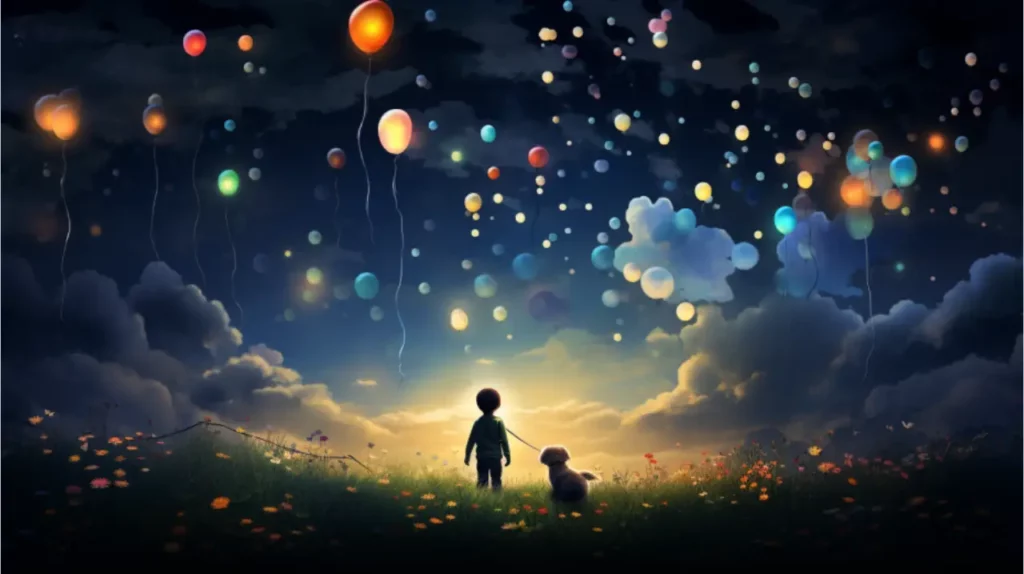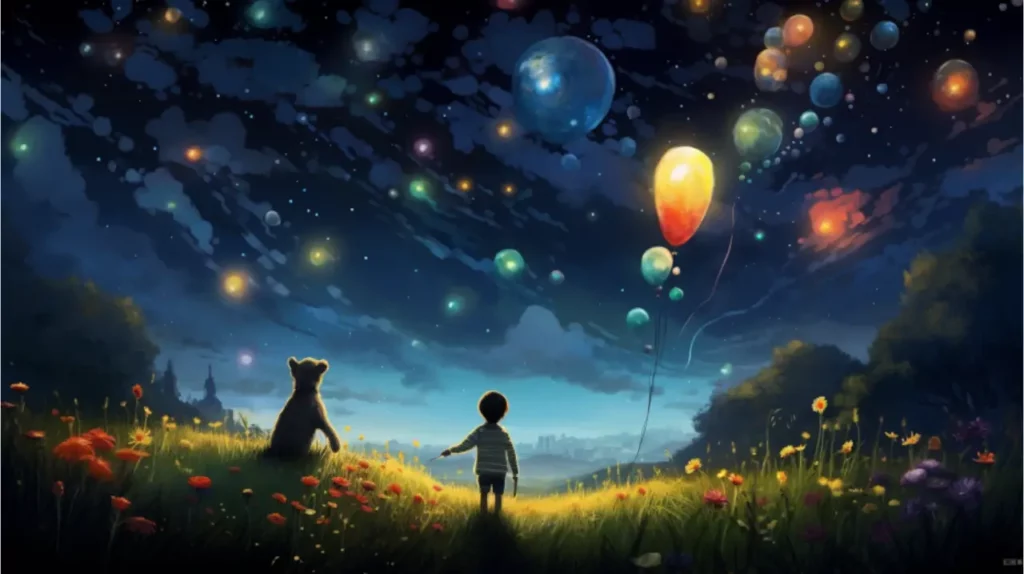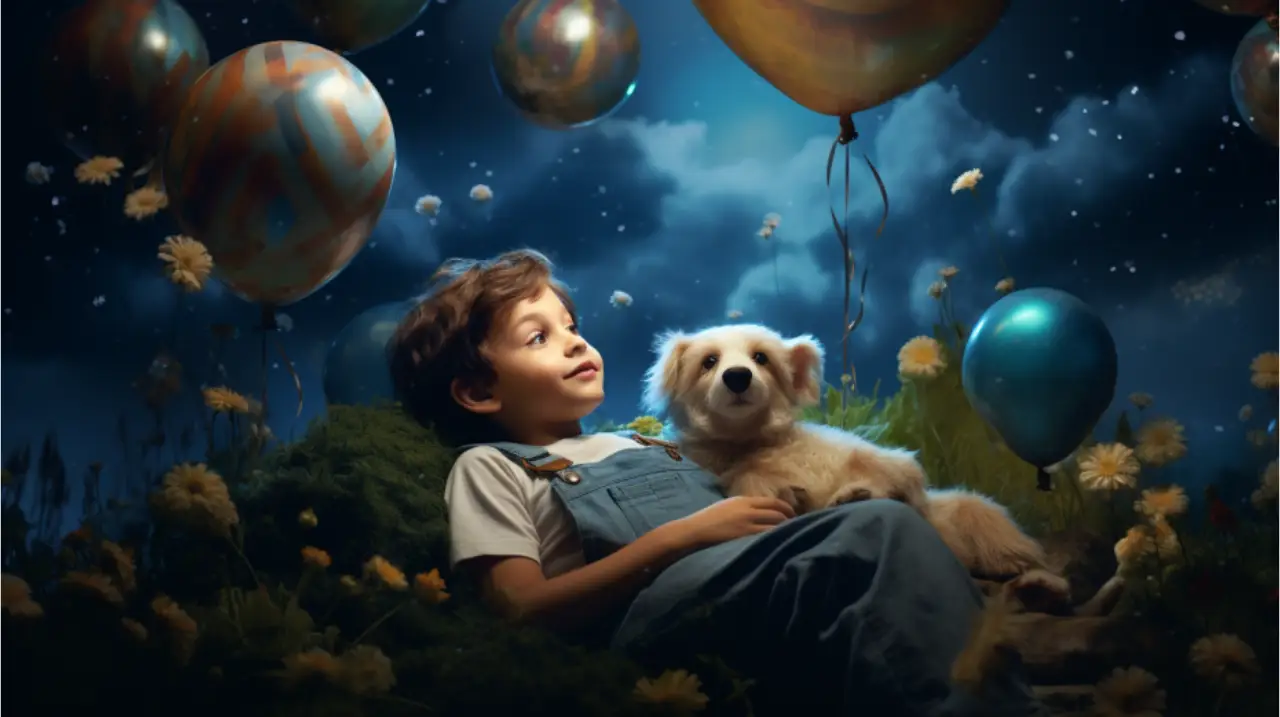Have you ever wondered what your dreams about your childhood dog could mean? In this article, we will delve into the intriguing world of dream interpretation and explore the symbolism behind these dreams.
By understanding the subconscious mind and emotional connections, we can gain insight into our past experiences and uncover hidden desires.
Whether you yearn for nostalgia or seek closure, interpreting recurring dreams of your childhood dog can offer profound understanding and healing.
Childhood Memories and Dream Symbolism
When interpreting your childhood dreams, it’s important to consider the symbolism behind the presence of a beloved family pet. Exploring dream symbolism can be a powerful tool for uncovering hidden memories and gaining insight into your subconscious.
The presence of a childhood dog in your dreams may represent loyalty, protection, or the need for companionship. Dogs are often seen as faithful and loving creatures, and their presence in your dreams may indicate a desire for support and unconditional love.
Additionally, the specific characteristics of the dog in your dreams can offer further insight into your childhood experiences. For example, a playful and energetic dog may symbolize a carefree and joyful time in your childhood, while a timid or aggressive dog may represent past fears or traumas.
The Role of Dogs in Our Lives

Dogs have long been recognized as loyal companions, offering unwavering support and companionship to humans. Their unconditional love and loyalty make them an integral part of our lives, providing comfort during challenging times and celebrating with us during moments of joy.
Furthermore, dogs have been shown to provide emotional support, helping to alleviate stress, anxiety, and loneliness.
Dogs as Loyal Companions
As a cherished member of your family, dogs play a crucial role in providing unwavering loyalty and companionship throughout your life. They are more than just pets; they become our best friends and confidants. Dogs have a unique ability to sense our emotions and provide comfort during times of distress. They have been used in canine therapy to help individuals cope with anxiety, depression, and other mental health issues. The benefits of canine therapy are well-documented, as dogs have a calming effect on humans and can help reduce stress levels. Additionally, dogs are symbols of loyalty and unconditional love. They never judge us and are always by our side, offering support and affection. This unwavering loyalty is a testament to the special bond that exists between humans and dogs.
| Column 1 | Column 2 | Column 3 | Column 4 |
|---|---|---|---|
| Canine therapy | Benefits | Dogs as symbols of loyalty | Unconditional love |
Dogs and Emotional Support
Throughout your life, your childhood dog continues to provide emotional support and plays a vital role in helping you navigate the ups and downs of life.
Dogs have been recognized as therapy animals for their ability to provide comfort and emotional support to individuals with mental health conditions. They have an innate ability to sense and respond to our emotions, offering unconditional love and companionship.
Studies have shown that interacting with dogs can increase levels of oxytocin, a hormone associated with bonding and relaxation, and decrease levels of stress hormones like cortisol.
Dogs can also provide a sense of routine, responsibility, and purpose, which can be beneficial for individuals struggling with mental health issues.
Whether it’s through a wagging tail, a warm snuggle, or a playful game of fetch, dogs have a unique ability to bring joy and comfort to our lives, making them invaluable companions for mental health.
Understanding the Subconscious Mind
To truly comprehend the power of your subconscious mind, dive deep into the realm of dream interpretation. Dreams have long been recognized as a window into our innermost thoughts and emotions, offering a unique opportunity to explore hidden fears and subconscious desires. Through dreams, we embark on a journey of self-discovery, where the symbols and imagery that unfold hold profound meaning.
Understanding the power of symbolism is crucial in unraveling the messages from your subconscious mind. Dreams often speak in a language of symbols, using objects, people, and scenarios to represent deeper truths. By decoding these symbols, you can gain valuable insights into your own psyche.
Dream interpretation allows you to tap into your subconscious mind, enabling you to uncover hidden desires, unresolved conflicts, and unexplored aspects of your personality. It provides a platform for introspection, enabling you to better understand yourself and the motivations behind your actions.
Exploring the depths of your subconscious mind through dreams is a powerful tool for personal growth and self-awareness. By delving into the rich tapestry of symbolism, you can unlock the secrets of your inner world and embark on a transformative journey of understanding.
Exploring Emotional Connections Through Dreams
To further delve into the realm of dream interpretation, you can explore emotional connections through dreams, allowing you to uncover deep-seated feelings and experiences. Dreams serve as a window into our subconscious, offering a glimpse into the complex workings of our minds.
By examining the emotional connections within our dreams, we can gain valuable insight into our own psyche. Exploring dream symbolism can provide a deeper understanding of the messages and meanings behind our dreams. The symbols that appear in our dreams often represent significant aspects of our lives, such as relationships, fears, or desires.
By analyzing these symbols and the emotions they evoke, we can begin to unravel the hidden layers of our subconscious. This process of self-reflection can be incredibly healing, as it allows us to confront and process our emotions in a safe and controlled environment.
Nostalgia and Longing for the Past
As you explore the emotional connections within your dreams, nostalgia and longing for the past can emerge as powerful themes.
Dreams have a way of evoking deep-seated emotions and bringing forth forgotten memories. When you dream about your childhood dog, it isn’t uncommon to experience nostalgic feelings and a longing for innocence.
Your dreams might transport you back to a time when life was simpler, when your biggest worry was whether your dog would catch the ball you threw. This longing for the past is a natural response to the complexities and challenges of adulthood. It represents a yearning for the carefree days of youth, when responsibility was a foreign concept.
Through these dreams, your subconscious mind may be reminding you to reconnect with your inner child and find moments of joy and simplicity in your present life.
Unresolved Emotions and Unresolved Relationships
As you delve into the meaning of your childhood dog dreams, it’s important to consider the possibility of unresolved emotions and relationships.
Childhood trauma can have a lasting impact on your emotional well-being, leading to unresolved feelings that may manifest in your dreams.
Through self-reflection and introspection, you can begin to heal these unresolved emotions and relationships, allowing for personal growth and a deeper understanding of yourself.
Childhood Trauma’s Impact

The impact of childhood trauma on unresolved emotions and relationships can be significant. Childhood trauma can have long-lasting effects on mental health and the ability to form and maintain healthy relationships.
Here are three ways in which childhood trauma can impact unresolved emotions and relationships:
- Impact on Mental Health: Childhood trauma can lead to the development of mental health disorders such as anxiety, depression, and post-traumatic stress disorder (PTSD). These conditions can cause unresolved emotions to resurface and affect relationships.
- Coping Mechanisms: Individuals who’ve experienced childhood trauma may develop unhealthy coping mechanisms such as substance abuse, self-harm, or avoidance. These coping mechanisms can hinder the ability to address and resolve unresolved emotions, leading to strained relationships.
- Trust and Intimacy Issues: Childhood trauma can create trust and intimacy issues, making it challenging for individuals to form and maintain healthy relationships. Unresolved emotions from the past can cause fear, insecurity, and difficulties in opening up to others.
Understanding the impact of childhood trauma on unresolved emotions and relationships is crucial in providing support and healing for those who’ve experienced such trauma.
Healing Through Self-Reflection
To heal from the impact of childhood trauma on unresolved emotions and relationships, it’s important for you to engage in self-reflection.
Self-discovery is a powerful tool for emotional healing and growth. By taking the time to reflect on your experiences and emotions, you can begin to understand the root causes of your unresolved emotions and relationships. This process allows you to uncover patterns and triggers that may be contributing to your current struggles.
Through self-reflection, you can gain insight into how your past experiences have shaped your beliefs, behaviors, and relationships. It provides an opportunity to examine and challenge any negative or limiting beliefs that may be holding you back.
Emotional healing is a gradual process, and self-reflection plays a crucial role in facilitating that journey. By exploring and addressing unresolved emotions and relationships, you can begin to heal and create healthier, more fulfilling connections in your life.
The Significance of Dog Breeds in Dreams
Understanding the significance of different dog breeds in your dreams can provide valuable insights into your subconscious mind. Each breed carries its own symbolism, which can help you interpret the messages your dreams are trying to convey.
Here are three common dog breeds and their potential meanings in dreams:
- Labrador Retriever: Known for their loyalty and friendly nature, dreaming of a Labrador may represent your need for companionship and support. It could indicate a desire for more meaningful connections in your waking life.
- German Shepherd: This breed is often associated with protection and strength. Dreaming of a German Shepherd might suggest that you’re seeking guidance or reassurance in a challenging situation. It could also symbolize your own inner strength and resilience.
- Chihuahua: Often seen as small and fragile, dreaming of a Chihuahua could represent feelings of vulnerability or insecurity. It may indicate a need to assert yourself and stand up for your beliefs.
The Symbolism of a Lost Childhood Companion
Losing a childhood companion, such as a dog, holds immense emotional significance. The bond formed during those formative years can shape the way we relate to others in adulthood, impacting our ability to trust, form attachments, and navigate intimate relationships.
Furthermore, the loss of a childhood companion may be a manifestation of unresolved childhood trauma, which can have lasting effects on our emotional well-being.
Emotional Significance of Loss
When you lose a childhood companion, such as a beloved dog, the emotional significance of that loss can be profound. It isn’t uncommon to experience feelings of sadness, longing, and grief. However, dreams can provide a healing outlet for these emotions, allowing for emotional healing through dream interpretation.
Here are three ways in which the symbolism of a lost childhood companion in dreams can help in the process of emotional healing:
- Reflection: Dreams about a lost childhood companion can serve as a reflection of the deep emotional bond that was formed. They allow you to revisit and process the memories and emotions associated with that loss.
- Closure: Dreams can provide a sense of closure that may be lacking in real life. They offer the opportunity to say goodbye, express any unresolved emotions, and find peace in the acceptance of the loss.
- Transformation: Dreams about a lost childhood companion can symbolize personal growth and transformation. They can serve as a reminder of the lessons learned from the relationship and the strength gained from overcoming the loss.
Impact on Adult Relationships
The presence of a lost childhood companion, such as a beloved dog, in your dreams can have a profound impact on your adult relationships, highlighting the symbolism of emotional attachment and the lasting influence of past connections. The emotional bond formed with a childhood dog can shape your understanding of attachment styles and affect how you navigate romantic relationships in adulthood.
| Impact on Romantic Relationships | Understanding Attachment Styles |
|---|---|
| Dreams featuring a lost childhood dog may trigger feelings of loss and longing, which can impact your ability to form secure attachments in romantic relationships. | The attachment style developed with your childhood dog can influence your attachment style in adult relationships. If your childhood dog provided consistent love and support, you may have a secure attachment style, enabling you to form healthy and trusting relationships. Conversely, if your childhood dog was inconsistent in their affection, you may have an anxious or avoidant attachment style, leading to difficulties in maintaining intimacy and trust. |
Understanding the impact of a lost childhood companion on your adult relationships can provide valuable insight into your emotional patterns and behaviors. By recognizing and addressing any unresolved emotions tied to your childhood dog, you can work towards forming healthier and more fulfilling connections with others.
Unresolved Childhood Trauma
Addressing unresolved childhood trauma is crucial for understanding the symbolism of a lost childhood companion, such as a beloved dog, and its impact on your adult life. Childhood trauma can leave deep emotional scars that continue to affect us even in adulthood. Here are three key insights to consider about unresolved childhood trauma and its connection to a lost childhood companion:
- Healing through therapy: Seeking professional help through therapy can provide a safe space to explore and process unresolved childhood trauma. Therapists can help uncover the root causes of trauma and guide individuals towards healing and resolution.
- The power of forgiveness: Forgiveness can be a transformative tool in the healing process. By forgiving those who may have caused childhood trauma, individuals can release the burden of resentment and find healing and peace within themselves.
- Reconnecting with lost companions: The loss of a childhood companion, such as a dog, can symbolize the loss of innocence and security. Reconnecting with lost companions, whether in reality or through memories, can be a way to reclaim a sense of comfort and healing from unresolved childhood trauma.
Dreams as a Reflection of Personal Growth
As you explore the dream meaning of your childhood dog, understanding how dreams can serve as a reflection of your personal growth becomes apparent. Dreams have a way of tapping into our subconscious desires and fears, allowing us to explore and process them in a safe and symbolic space.
When you dream about your childhood dog, it could represent a longing for the innocence and simplicity of your youth. It may also symbolize loyalty, companionship, and unconditional love, qualities that you may be seeking or cultivating in your current life.
Additionally, the dream could be a reflection of your personal growth and development, showing how your relationship with your childhood dog has evolved and shaped you into the person you’re today.
Dreams can provide valuable insights into our inner world, helping us navigate our journey of personal growth and self-discovery.
The Influence of Childhood Experiences on Dreams
Your childhood experiences play a significant role in shaping your dreams. Early memories, both positive and negative, can influence the imagery and themes that appear in your subconscious mind.
Childhood traumas, such as an incident involving a beloved pet, may resurface in your dreams as a way of processing and understanding those past events.
Understanding the influence of your childhood experiences on your dreams can provide valuable insights into your emotional and psychological well-being.
Early Memories Shaping Dreams

Exploring the impact of childhood experiences on dreams, memories from early years shape the content and themes of your nightly visions. Your dreams aren’t random; they’re influenced by significant events and emotions from your past. These early memories serve as the foundation for the symbolism and patterns that appear in your dreams.
- Emotions: Childhood experiences, especially those that were intense or traumatic, can resurface in your dreams, reflecting the unresolved emotions associated with them.
- Relationships: The dynamics and relationships you had with family members, friends, and pets during your childhood can manifest in your dreams, highlighting the importance of these connections.
- Environment: Your dreams may recreate the physical spaces and settings of your childhood, allowing you to revisit familiar places and explore the emotions and experiences tied to them.
Childhood Traumas Affecting Dreams
Childhood traumas significantly impact the content and themes of your dreams, as they resurface through unresolved emotions and manifest in relationships, emotions, and environments. The psychological impact of childhood trauma can be profound, influencing various aspects of your life, including your dreams. Dream therapy has emerged as a valuable tool in addressing and healing these deep-rooted traumas.
Through dream therapy, individuals are encouraged to explore their dreams and unravel the hidden meanings behind them. By doing so, they can gain insight into the unresolved emotions and experiences from their past. This process allows them to confront and process their childhood traumas, leading to emotional healing and personal growth.
To better understand the relationship between childhood trauma and dreams, let’s examine the table below:
| Childhood Trauma | Dream Themes |
|---|---|
| Abuse | Powerlessness, vulnerability, fear |
| Neglect | Abandonment, loneliness, longing |
| Loss | Grief, sadness, separation |
Healing and Closure Through Dream Interpretation
Achieve healing and closure by interpreting your dreams. Dream analysis can be a powerful tool to help you navigate the complex emotions and memories that may arise from past traumas. By understanding the symbolic meanings behind your dreams, you can gain insight into your subconscious mind and find resolution for unresolved issues. Here are three ways dream interpretation can contribute to your healing journey:
- Uncovering hidden emotions: Dreams have a way of bringing suppressed emotions to the surface. By analyzing your dreams, you can identify and process these emotions, leading to a greater sense of self-awareness and emotional healing.
- Resolving unresolved conflicts: Dreams often depict unresolved conflicts from the past. By interpreting these dreams, you can gain a new perspective on these conflicts and find ways to resolve them, bringing closure and peace to your life.
- Connecting with your inner self: Dream analysis allows you to tap into your inner wisdom and intuition. It provides an opportunity to connect with your subconscious mind and gain valuable insights into your deepest desires and needs, leading to personal growth and healing.
Reconnecting With Past Emotions Through Dreams
By delving into the realm of dream interpretation, you can rediscover and confront past emotions through the lens of your dreams. Dreams have the remarkable ability to transport us back to significant moments in our lives, allowing us to reconnect with the emotions we once felt. Analyzing recurring dream patterns can provide valuable insight into unresolved feelings from our past, helping us to gain a deeper understanding of ourselves. Dreams often evoke a sense of nostalgia, stirring up memories and emotions associated with our childhood or past experiences. Nostalgia plays a crucial role in dream interpretation as it allows us to explore the significance of these emotions and how they have shaped our present selves. Through dream analysis, we can begin to unravel the complexities of our past and reconnect with the emotions that have shaped us.
| Analyzing recurring dream patterns | Exploring the role of nostalgia in dream interpretation |
|---|---|
| Helps gain insight | Provides a deeper understanding of oneself |
| Unravel complexities of the past | Reconnects with emotions that have shaped us |
Uncovering Hidden Desires and Aspirations
What hidden desires and aspirations can your childhood dog symbolize in your dreams? Exploring subconscious desires and understanding childhood nostalgia are key factors in deciphering the meaning behind your dreams of a childhood dog. Here are three possible interpretations to consider:
- Security and Protection: Your childhood dog may represent a desire for safety and protection in your waking life. It could be an indication that you long for a sense of security and stability.
- Unconditional Love and Loyalty: Dogs are often associated with loyalty and unconditional love. Dreaming of your childhood dog could signify your deep longing for genuine connections and relationships based on trust and loyalty.
- Freedom and Playfulness: Childhood memories are often associated with carefree moments and a sense of playfulness. Dreaming of your childhood dog may reflect a desire to reconnect with that inner child and experience more joy and freedom in your adult life.
Understanding the hidden desires and aspirations represented by your childhood dog in dreams can provide valuable insights into your subconscious and guide you towards personal growth and fulfillment.
Interpreting Recurring Dreams of a Childhood Dog
If you frequently dream about your childhood dog, it’s important to delve deeper into the recurring symbolism and analyze the underlying messages they may hold. Dreams have long been viewed as a window into the subconscious mind, and recurring dreams often carry significant meaning.
When it comes to interpreting recurring dreams of a childhood dog, one must consider the symbolism associated with dogs and the nostalgic connection to one’s past. Dogs are often seen as loyal companions, representing friendship, loyalty, and protection. In the context of childhood, they may symbolize innocence, playfulness, and a yearning for simpler times.
The recurring nature of these dreams suggests that there may be unresolved emotions or experiences from your childhood that need to be addressed. By reflecting on your dreams and exploring the emotions they evoke, you can gain a deeper understanding of yourself and potentially find healing and closure.
Conclusion
In conclusion, dreams about childhood dogs can hold significant meaning and symbolism. They often represent our emotional connections and desires from our past.
Exploring these dreams can provide insights into our subconscious mind, serving as a tool for healing, closure, and self-discovery. By interpreting recurring dreams of a childhood dog, we can uncover hidden emotions and aspirations, allowing us to reconnect with our past and gain a better understanding of ourselves.


